Check "Cheap Vacations" on Amazon: http://amzn.to/2uwUxYD
 The One Bag Traveler recommends Gear, Destinations and Adventures.
The One Bag Traveler recommends Gear, Destinations and Adventures.
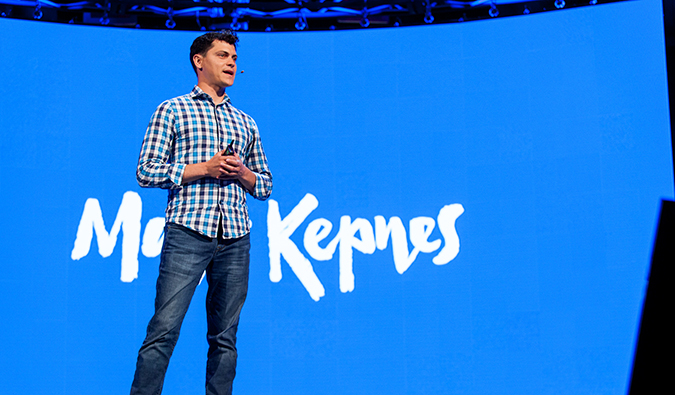
Back in January 2008, I’d just returned from my trip around the world. I was broke and got a temp job at a hospital. My job was to sit there, answer phones, open the mail, and just generally not break anything while the full-time assistant was on maternity leave. Within a few days, I said to myself “This is not for me.” Being back in a cubicle felt like I was back to the same spot I left. Like the last 18 months on the road hadn’t happened. It was dispiriting. I wanted to be “out there” — that mythical place that was anywhere but home.
Sitting in that cubicle, I wondered, “What could I do to keep me traveling?”
“Travel writer” seemed like a good idea.
So I started a blog to showcase my work, get freelance writing gigs, maybe write some guidebooks, and hopefully make a living from this all. I imagined myself a cross between Bill Bryson and Indiana Jones.
I bugged my design friends for help, learned HTML, wrote blog post after blog post, connected with other bloggers, pitched stories to online publications, and figured out SEO and social media.
Today is the anniversary my first post. I can’t believe I am still at it ten years later. What started as an online resume has morphed into a business that includes this website, a charity, hostel, conference, blogging course, community meet-ups, tours, ebooks, and a NYT best selling book.
So, on today’s ten-year anniversary, I want to share some of the business/blogging lessons I learned (often the hard way) in the past decade:
1. Being first helps, but it’s not a prerequisite for success.
When I started, travel blogging was in its infancy. Starting before it became mainstream certainly helped contribute to the success that I have today. It would be foolish to deny that.
But it’s not the most important thing. After all, Netscape was first — but how many of you still use that today?
And I can name dozens and dozens of blogs that went under despite having started early.
But more importantly, I can name dozens and dozens of blogs that have started in the last few years that have done extremely well.
What matters more than being first is being persistent and innovative, creating quality content, offering something that solves your readers’ problems, networking, and many other things. “Being first” would be low on my list of “things you need for success.”
2. You’re going to change — and so will your blog. That’s OK.
Your life is going to change — and so is your blog. At first, I wanted to travel a lot and just blog. Now, I want to stay in place more. Build a routine. Go to the gym. Write more books. Maybe start a podcast. Mentor more. Do more community events.
Basically, not be nomadic anymore.
For a long time, I resisted that change. I tried to still be the person I was when I started this whole thing. What would I be if not Nomadic Matt? How would this website continue?
Then I said, “Who cares? So long as this website is helping people travel, it’s not really important if I am always on the road. The content matters more than anything else.”
People will either love it…or they won’t, being on (or off) the road won’t change that.
Moreover, the lives of your readers will also change. They will get older too. They will have new desires. Maybe people stop reading your blog because they find it boring. Or they grow out your advice, Or they simply stop traveling. It doesn’t matter. That’s just how it is.
Life changes for you and your readers.
Don’t fear change.
3. Don’t do this for you. Do it for your readers.
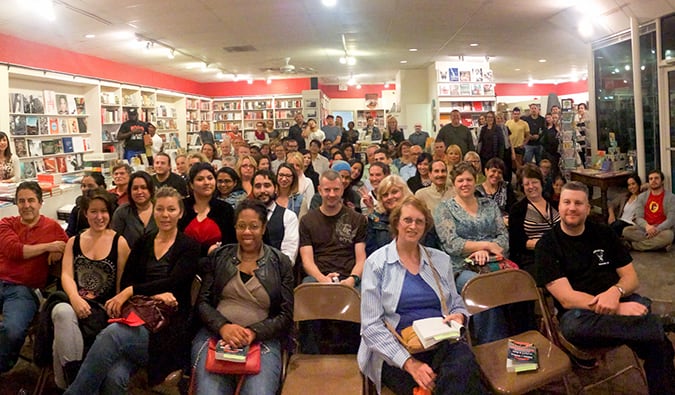
Do you know who the most successful people are? The ones who wake up and think about how they make someone’s life better. The people who do whatever it is they do for a reason beyond themselves. If your goal is to get free travel and how to do cool stuff for yourself, the Internet will quickly tire of you. No one wants to read the story of someone doing things they can never do. “Inspiration porn” only goes so far. We all want people – and businesses – that solve a problem we have a problem in our life. That can be anything from the mundane “I need to know how to dress better” to the esoteric “what do I do with my life?”
No matter what you do, do it for your readers. Think about how to solve their problems.
Do something that makes your audience go, “Because I came here, my life is better.”
For me, that’s helping people travel cheaper. Figure out what it is for you. Your mission should never be “How can I make my life better?” People will see through that. Being a personality on the Internet only lasts so long as your schtick is in vogue.
If your mission is reader centric, you’ll stand the test of time.
4. Because your readers want you to succeed.
Your audience wants to support you. They read you for a reason. Give them a way to support you. Don’t think, “Oh, people just like free stuff. I’m gonna need to throw up ads and do brand deals or I’ll be broke.” People want to support artists and creative people they love. Don’t be afraid to sell them a product you created. Or start a Patreon page. Or do tours. Or create a subscription service for added content. Mark Manson does that for $5 a month. You know what? I bet a lot of people pay that.
Give people a way to support you and they will surprise you. Because when you create something that helps people and improves their lives, they want to support you. They will go out of their way to do so. Because everyone wants to help those that help them.
5. Ways to monetize will change greatly.
There have always been easy ways to make money online. First, it was Google’s ad network, AdSense. You’d slap up a few ads that looked like normal links and people would click away. Then it was banner ads. (Those both still exist, but how many of us click on banner ads?) Then it was selling text links to companies trying to game SEO. Then sponsored posts that did the same thing but were supposedly harder for Google to detect.
Each was a fad that people said would last forever. (Now, it’s “influencer” marketing, where everyone with a following gets free stuff, and people are still saying the same thing about that.)
But everything changes.
If you’re only doing the most popular thing to make money online, you are going to fail. When the tides shift, you’ll be left holding the bag and having to start over again.
Never rely on a fad for your income. EVER.
For example, you used to be able to sell e-books for like $50. Now, thanks to Amazon and people used to $1.99 Kindle books, that’s changed. No one buys expensive ebooks anymore. Ebooks are a cheap product. We sell a lot of ebooks and had to adapt our model…but it also forced us to figure out other ways to monetize. We used to rely on one page for a lot of our affiliate income but then it dropped in Google and we had to scramble to figure out what to do.
Always assume whatever it is your doing is not going to last. It will keep you innovating.
6. Create your own products.
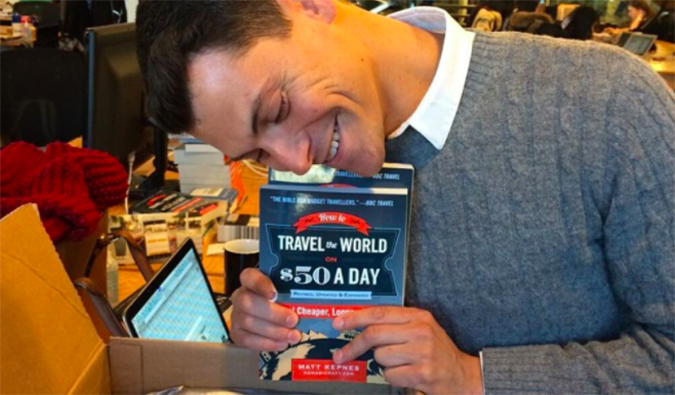
Continuing on that idea, own your income stream as much as possible: e-books, tours, T-shirts, whatever.
When I started out, I sold a lot of text links (see #6). Then one day it all went to zero after Google changed its algorithm. It didn’t bother me, though, because by then I had already moved on. I had e-books. Then tours. Then courses. A hostel. A conference. I had diversified my income and created my own products.
Having your own thing — no matter what it is — means you don’t rely on others for your income because you never know what could happen. Amazon could kick you out of its program or cut its payout in half (we got kicked out for a few months and lost thousands. Luckily, we’re back in but that money is gone), influencer marketing could change, brands might not want to work with you, or someone could cut their affiliate rate or stop offering their program altogether.
When 100% of your income is from other people, you are 100% at the mercy of other people. Creating your own products allows you to be independent.
Always own your income.
7. Your first stuff will suck.
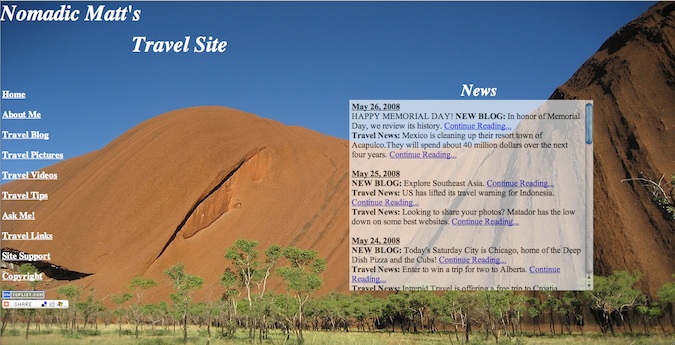
Years from now, you’ll look back at your first articles and go, “Who the hell wanted to read this? This is horrible!” Or you’ll look at the first version of your website (see above) and go “What the F was I thinking!!!” It’s only natural. It means you’ve grown as a writer (and a blogger). It’s about progress, not perfection. In the beginning, don’t obsess about your work (whether writing or design). Just put it out there and go back later and fix it.
Why? You only get better by doing. Never wait for perfection. And if you wait for perfection you’ll never start your blog. There’s no cost to putting up a website. Just get it up there and fix the problems later!
8. SEO is not a dirty word.
A lot of bloggers think SEO is this dirty thing, that optimizing for Google takes away from the “humanness” of their website. But every day, billions of people search for answers to their questions. Optimizing your website for search engines means that your website can be the one that answers their question. It’s a source of unlimited free traffic!
Over the last decade, focusing on SEO has given me a huge advantage and has helped me reach millions of people, earn a living, and get media mentions (I once got a big feature on CNN because the journalist found me on Google).
9. Write for humans.
But still, write for humans. Don’t put in overly optimized content, because, at the end of the day, you want people to connect with your website. No one is loyal to WikiHow or another generic information website. People read blogs because they connect with the voice behind it. Optimize for Google, but write for humans.
10. There will always be setbacks.
Six years after I started this blog, I lived on credit cards for three months. I had put all my money into a Kickstarter project, and until that ended, I was broke. I hit my fundraising goal, paid off my bills, and launched the app. But it turned out I didn’t know how much work apps were, and, by the time I stopped updating the app, I was down $10,000.
I’ve run sales that didn’t go anywhere. Launched books no one bought. Hosted webinars no one showed up to. Made shirts no one wanted. Redesigned parts of my website that caused conversions to crash. Hired consultants that didn’t do anything but sap my bank balance. Tried video that went nowhere.
I’ve failed constantly.
The trick is to remember that failure is a teacher. Sure, it sucked wasting time and money on all these projects that didn’t work out but we took the lessons from these projects and improved the site and reader experience other ways. If you believe in your mission, just pick yourself up, dust yourself off, learn, and move forward. You’ll find another way to get your message across.
As Edison said, he didn’t fail, he just found 10,000 ways that didn’t work.
11. People will be really mean. I mean REALLY mean.
The Internet brings out the best — and the worst — in people. They will get really mean. I mean so mean that you’ll want to curl up into a ball and cry. You might actually do so. I have a whole folder of all the mean emails I get.
You have to learn to develop a thick skin. Because it is only going to get worse the bigger you get.
It takes time to learn to do this, but don’t take it personally. It’s never about you. It’s about their problems and their lives. People like to troll to make themselves feel better. You’re just their current target.
Just ignore the haters and move on. It’s easier to say than do, but you must!
Because for every troll, there are a thousand people who value what you do.
And, when you get a troll, send this video:
12. Start an email list.
From the day you start your blog, start an email list. Tweets, Facebook, social media — people miss those updates all the time.
Social media changes all the time. Facebook says “pay me or never your readers will never see your content,” Vine goes out of business, and Instagram does some funky stuff — and suddenly you can’t reach people anymore.
But no one misses an email. Everyone checks their inbox all the time! Email is still king. My greatest mistake was not starting an email list right at the beginning. Forget about the likes. Get emails and you’ll always own control of your audience. No algorithm can take that away from you.
13. Never call yourself an influencer.
Stephen King has influenced a generation of writers, George Lucas a generation of sci-fi fans, Gloria Steinem a generation of women. Ditto to folks like Gene Roddenberry, Ernest Hemingway, Tim Ferriss, Carrie Fisher, Gal Gadot, Levar Burton, Mr. Rogers, Steve Jobs, and countless others.
They got people to do something. To better themselves, read more, follow their dreams, and strive to be better.
They influenced.
Do they go around calling themselves influencers?
No.
Why?
Because being an influencer is a fake profession created by millennials and social media “stars.”
You have influence when people listen to you. When I find myself thinking “What would Bryson do?” — that’s Bryson’s influence. My friends have influence over my life when I follow their recommendations. In some ways, I have influence when I suggest something travel related and someone does it.
You have influence when you provide value and make someone’s life better.
You do NOT have influence because 20,000 people “liked” a photo on their way home from work.
True influence comes not from calling yourself an influencer but from what you actually do and the example you set.
Don’t set out to be an influencer. Because that is YOU centric. Not READER centric. (See #3 again.)
14. Success takes time.
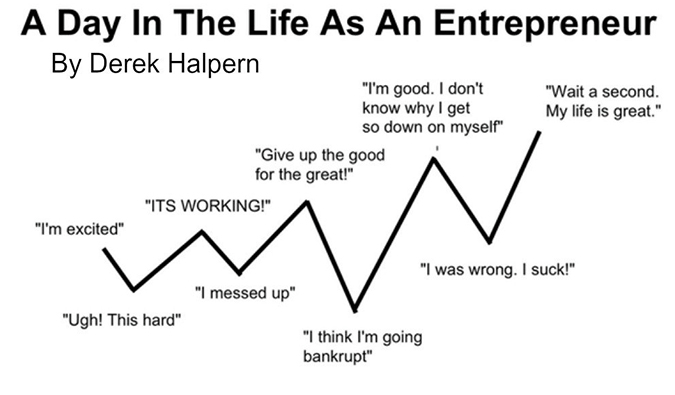
(Photo from Derek Halpern)
A lot of people try to become insta-famous these days. They want to be rich and successful NOW and don’t care how they get there. But where are those Vine stars now?
I can’t fault people who want quick cash, but remember, real success takes years to achieve. It’s work. Anthony Bourdain didn’t get famous overnight. Stephen King was rejected countless times. Morgan Freeman didn’t get famous until he was 40. It took me years to turn this into a living.
This is a marathon, not a sprint.
If you don’t have the patience for the long haul, you should find something else to do.
15. There will always be someone better.
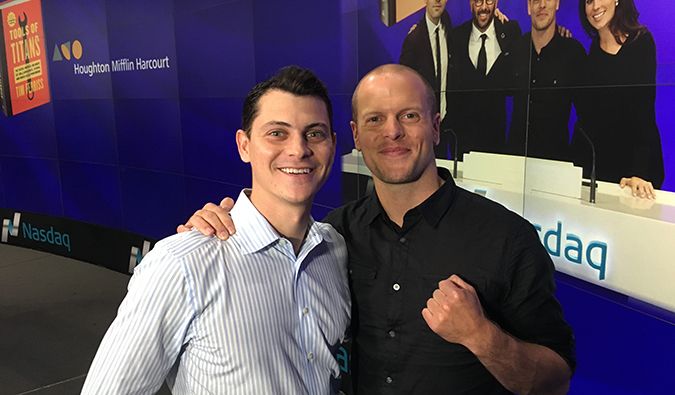
Be humble. Remember that as good as you think you are, there is someone better. I can name ten people who do what we do better. All that does it make me try harder. Don’t say, “that person is making it and I’m not.” Say, “That person is way better than me. What can I learn from them?”
Only fools think they are wise. People who don’t learn or find mentors are the ones that fade away. Most of the bloggers I know who stagnated or failed were also the ones that never read books, never found mentors, or never attended conferences. They never improved themselves. My success is in part because I always sought out new knowledge, books, and especially teachers. I wouldn’t be here without my mentors.
If you aren’t learning, you aren’t growing.
16. If you’re going to be a business, treat this like a business.
It’s easy to view everything as having a cost, but investing in your business is the surest way to grow it.
When I started, I didn’t have much money and I hated spending money on things. I found the cheapest designers, hosting, virtual assistants, and tech support. I went cheap — and I also did a lot by myself. I regret that. Now I wish I had paid a little more for quality.
I know what it is like to start your blog with not a lot of money, but the day you decide to make this a business, put more money into it. Buy a nicer theme, get a better hosting platform, get a better email service, hire someone to help. This will help you grow quicker. And the quicker you’ll grow, the sooner you’ll start making up the costs of your investments.
The scariest thing I did was hiring a full-time employee, but it allowed me to do so much more. It allowed me to make a much better website.
I once paid $5,000 to go to a high-level conference. Why? I knew the people there were going to help me go the next level. It was a lot of money and I couldn’t really afford it, but I knew if I was going to grow my business, I needed the people in that room to help me out. If the right people are in the room, no amount of money is too much.
17. Don’t be afraid to take a second job.
When I started, I was working as an English teacher. Daymon John from FUBU waited tables while he built his business. Don’t be afraid to get a second job while you develop this venture. It may take longer to get off the ground, but it’s a lot better than being a starving artist!
18. It’s OK to walk away.
via GIPHY
If you don’t want to do this, walk away. If you start a project and don’t love it, walk away. We get so invested in projects that our pride keeps us from giving up on them. But sometimes you just need to walk away. Successful entrepreneurs don’t double down. They know when to walk away and shift their energies to something else.
19. Remember timing is everything.
Timing and luck are everywhere. Being at the right place at the right time is a big percentage of success. I got lucky by starting when there wasn’t a lot of competition. I got lucky by having good teachers, seeing that Tweet that got me a New York Times interview, and that Facebook ad that got me an invite to a conference attended by the best businesses minds in the world. I got lucky when someone found my website and featured me on CNN, sending a ton of traffic and more interview requests. A lot of success is just being at the right place at the right time.
I never think, “I am a success because I am great at everything.” No, I am a success because I’m better than average at a lot of things (and outsource the things I suck at) but also because I’ve been in the right place at the right time.
Remember that. No one is a success because they are great at everything. People are a success because of a combination of skill and luck.
As Mary Schmich said, “Advice is a form of nostalgia; dispensing it is a way of fishing the past from the disposal, wiping it off, painting over the ugly parts, and recycling it for more than it’s worth.”
But I hope you found something of worth here as you start your own ten-year journey.
P.S.- If you’d like to learn how to start a blog the right way, avoid my early mistakes, and get a peek at all the processes and methods I use to continue to grow this website (without scammy ads), check out my blogging course. It gives you all my secrets as well as direct feedback on your website from me and tech support from my tech team.
P.P.S. – If you’re in NYC, we’re hosting a meet-up Wednesday night at 7pm at Solas. Come join us! You can find out more and RSVP on our event page!
(Photo credits: 5)
--------------------------------
